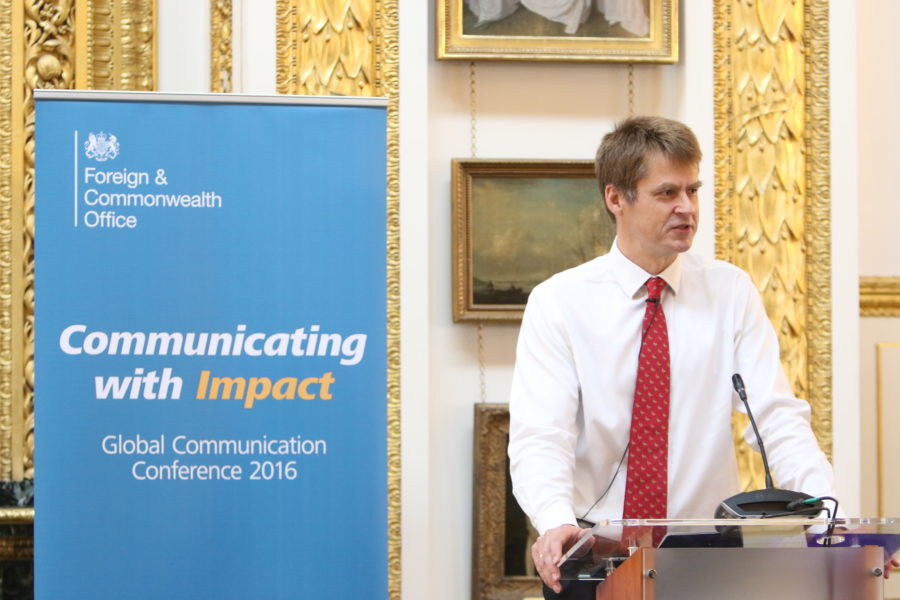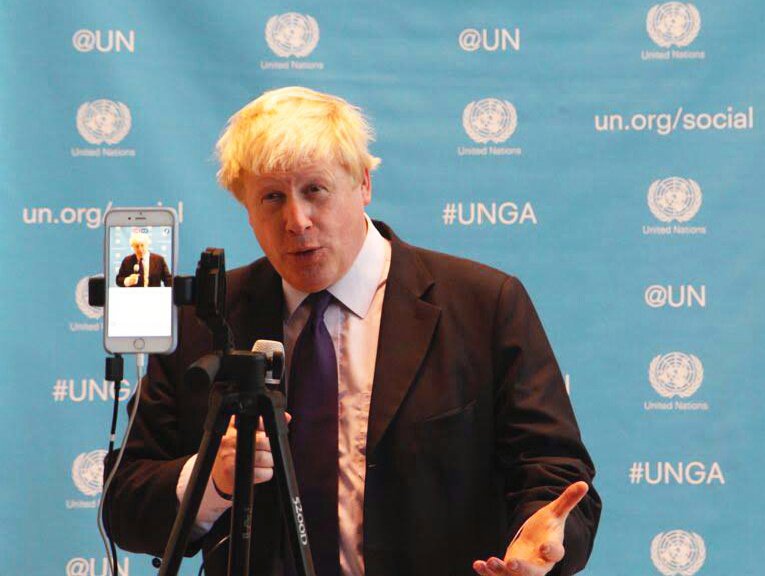30th March 2017
Digital Diplomacy: are we the champions?

Last year, Israel’s Ministry of Foreign Affairs brought together an interesting bunch of people from around the world, and me, to discuss digital diplomacy. I found myself speaking second on a panel. The first speaker announced the publication of the Digital Diplomacy Review 2016, ranking foreign ministries around the world. The United Kingdom was top.
It came to my turn. What, I was asked, did I think of this? HARDtalk, this was not. I said that the review’s methodology must have been excellent.
But the question got me thinking then (for aficionados, the much-expanded 2017 version on the State of Digital Diplomacy has just come out and is well worth a browse – congrats to @goyucel). And it still does. As I move on from leading the FCO’s communication effort after 4 years, I ask myself: are we, the reserved, traditional British, genuinely good at this? And if so, why?
In this world of fictions, a few facts: our network (268 Embassies, High Commissions, Consulates in 168 countries) is pretty active in digital diplomacy. We have over 7 million followers of our 700 official social media profiles across the world, on channels such as Facebook, Twitter and Instagram, with our most popular content reaching hundreds of thousands of people. We have simple, transparent guidance on social media use. We have a clear digital transformation plan and are putting more and more of our consular services online, so that if you are British and lose your passport overseas, you can get an emergency travel document to get you home, if you need help you can easily book a consular appointment online or legalise a document. And you can get real time, high quality travel advice 24/7. @AlisonLDaniels has just blogged about all this work.
What is behind what success we may have had? I am not sure, but here are three clues:
First, we like risk. Easy to say, hard to implement and fraught with tensions. “Seeking the edge, you’ll inevitably find yourself dangling perilously over it” writes David Sharma @AusAmbIsrael. Many of our envoys have told me the same thing. But they press on. The reality is that you can’t be successful at social media as a diplomat without taking risks. You have to be interesting, or no-one will read, watch or listen to you. The nuts and bolts of tough behind-the-scenes international negotiations are rarely the subject of Hollywood blockbusters (though if you have 5 minutes, this video with former Political Director Simon Gass did – tells a compelling story of one of the most important in recent times).
Boring stuff sinks rapidly to the sediment of the social media ocean, and stays there. “Create an argument” urges @TFletcher, formerly of this parish, now of Naked Diplomacy fame. Not the classic advice from a Foreign Minister to his envoys. But controversy clearly sells. Also, we have to be prepared to tolerate mistakes. We certainly don’t always get it right. And when we mess up, we clean up as best we can and carry on. For example our embassy in Washington apologised after we tweeted a picture of a White House cake surrounded by sparklers, “commemorating” the burning of the building 200 years ago. We hadn’t intended to offend but some thought our gesture was in poor taste.
Second, we innovate: our core digital team of just 16 is entrepreneurial – so we were the first foreign ministry on Snapchat; the first to use Twitter for customer service on our travel advice; UKinUSA was the first on Buzzfeed; our Embassy in New Zealand were the first to use Periscope; we’ve offered coverage of royal visits via WhatsApp; and one of the first to broadcast via Facebook Live. Our ambassadors don’t just have permission to experiment – we exhort them to try stuff out. Perhaps we are traditional in some ways, but we make innovation our tradition too.

Third, at our best, we have the mindset of a multi-media, engaged broadcaster and are gradually developing the skills to match. Social media allows us to reach audiences in ways we could never have dreamed of just 10 years ago. We engage with our audiences. We take ownership of our digital channels, we produce content that is attractive and authoritative and unlike this blog, overwhelmingly visual.
So risk, innovation and a multi-media mindset lie at the heart of our culture. And emerging from that digital petri dish is a generation of leaders who are exemplars of digital diplomacy, with expert digital communication teams in support.
Diplomacy is about understanding and exercising power. Power is about presence. Today, to be known, you must be digital. @FCOJohnCasson, @UKAmbRichard, @JonBenjamin19 are all in @Twiplomacy’s top 10 list of ambassadors with the most interactions (likes and retweets) last year. @JudithGoughFCO, @MennaRawlings, @UKinHungary, and too many others to mention are deeply and digitally engaged with their host countries: 350,000 people saw Iain Lindsay’s improbably popular video introduction to his role in Budapest. 600,000 saw his kilt-bedecked, gently musical, emotional Burns night walk through the shared history of Budapest and Scotland. Iain is the best known ambassador in Hungary, and if power is about presence that counts for something. The stories on @UKinFrance’s Les Voisins platform tell a very human tale of the deep personal and cultural interactions that bind our countries into a unique relationship of mutual endearment and provocation. Our embassy in Poland told a similar story of people who have shared ties between the UK and Poland published on the Belvedere Forum Facebook page.
But all is not roses. The competition is hotting up. In digital diplomacy, it is never job done. We need to continue to experiment to stay on our game. And it is a game that is fraught with tensions between:
- Control and creativity: governments love to “control the message” – and consistency and alignment are indeed vital. But Digital loves spontaneity and innovation. It is hard for (older) hierarchies to let go enough for the (newer) networks to be really effective.
- Risk and reward: we must be risk-takers but not reckless: the dividing line is a daily experiment. And do we have too many unengaging pictures of men (usually) shaking hands? Yes, we still do.
- The roles of civil servants and politicians: the old role of the civil servant was discreet, impersonal, behind the scenes, policy implementers not campaigners. How do the old distinctions hold up when social media has made whole populations into vociferous political actors and when personal presence is vital for influence?
- Personal and professional: civil servants generally like to keep their private lives private and live a low-key existence: but digital diplomacy is an exposed, often uncomfortable world where the dividing line between personal and professional is fading fast.
- Activity and impact: we are all human and love the numbers game. But we should not hide behind digital statistics and must constantly look in the mirror and ask ourselves what impact is our digital work actually having.
- Facts and fictions: as the #fakenews debate is showing, we need to build and keep a reputation for reliability and veracity: not easy given the suspicions and mistrust out there.
- And about the very legitimacy of Digital Diplomacy: “non-interference in the domestic affairs of States” is at the heart of the Vienna Convention. Yet the very best digital diplomacy can feel suspiciously close to that line. Does the Convention need a digital update?
So are we champions? To tell the truth I have no idea. I even doubt that other Foreign Ministries really matter (no offence, colleagues): the real “competition” are all those individuals, groups, institutions vying for the ears and eyes of those with influence for whom – digital or not – there are still only 24 hours in any day. And for whom, when all is said and done, talking in person remains a vital and often the most impactful form of engagement.
As we go about our job of promoting the prosperity, protecting the security and projecting the values of the United Kingdom, of telling the stories of who we are, what we are doing and why we are doing it (sometimes the subject of misunderstanding or bemusement); of listening to and engaging with others all around the world, we will continue to innovate. We will be ever more digital. We will still aspire to be the best foreign ministry because we are competitive and it’s fun and rewarding. We will have lots of ups and downs along the way. But we will do so mindful of the fact that human beings are at the heart of what matters and that digital diplomacy is only one means to the vital goal of diplomacy, which in the words of former Foreign Secretary Lord Hague is “to improve the condition of humanity”.

Very good indeed, real and true arguments that declare the power of digital power if used correctly, without fear of taking risks and always seeking the best.
Very good indeed, real and true arguments that declare the power of digital power if used correctly, without fear of taking risks and always seeking the best.
Very good, you said the whole truth because they are the best, really that is the secret of being champion in digital diplomacy.
Excellent blog with a resounding conclusion. It seems to me that if we are to ‘improve the lot of humanity’ humanity needs to be allowed to play its part – and that’s where digital comes in strongly.
I enjoyed your contribution to the outstanding event in Israel too.
Thank you
Alexandra